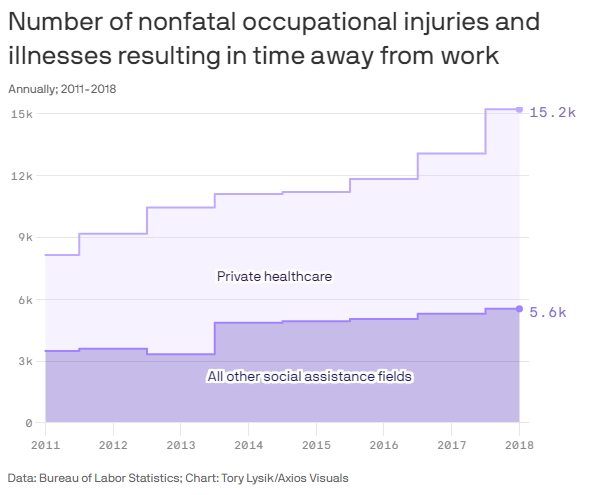Health-care workers are more likely than law-enforcement officers to have injuries and illnesses that keep them away from work

Kentucky Health News
“Health-care workers are increasingly being assaulted or shot on the job, making hospitals and clinics among the most dangerous workplaces in America,” report Tina Reed and Jason Millman of Axios.
They report that health-care workforce violence was a problem long before the pandemic, and then pandemic stressors such as backlash against public health measures and inadequate staffing have made matters worse.
In fact, “Data shows American health-care workers now suffer more nonfatal injuries from workplace violence than workers in any other profession, including law enforcement,” according to The Associated Press. And all of this can result in disrupted patient care and “alarming levels of burnout among the pandemic-fatigued health care workforce.”
“It used to be people had a respect for what was done in hospitals and the people who worked in those hospitals. That’s not there anymore,” National Nurses United Vice President Cokie Giles told Axios.
Axios reports that “about three in four nonfatal workplace violence injuries involved workers in health care and social work in 2020, the most recent year for which statistics are available. And, “the frequency of injuries from workplace violence in health care has risen almost every year since 2011, reaching 10.4 per 10,000 full-time workers in 2018, up 62% from 6.4 per 10,000 in 2011, per the Bureau of Labor Statistics.”
Reed and Millman cite several examples that suggest that this trend has continued throughout the pandemic, with an increasing number of assaults involving guns.
They also point to a recent survey of health care workers from Premier and the federal Agency for Healthcare Research and Quality that found 40% of health-care workers experienced workplace violence in the last two years.
Axios notes that hospitals are stepping up their efforts to ” identify security risks, training staff on violence prevention and calling in counselors to de-escalate tense situations” and are beginning to invest in technology to help detect guns entering the building. Further, The authors write, there are ongoing efforts in Congress and statehouses to make health care settings safer.